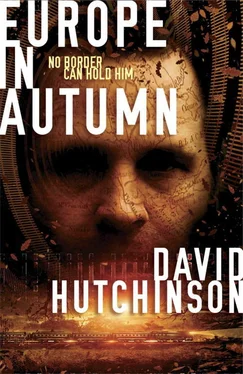In the kitchen, Rudi put basket after basket of dirty crockery onto the conveyor of the ancient Hobart dishwasher, walked round to the other end, and took baskets of clean crockery – heated to just short of the melting point of lead, it felt like – off. After three months handling red-hot plates and cups his fingertips had blistered and peeled and he was almost bereft of fingerprints, which he thought was an interesting effect.
“It was the same last year,” Jan said morosely, perched on one of the stainless steel worktops. “Fights, alcohol poisoning. They even let fireworks off in the hotel. I had to call the police.”
“But imagine the income,” Rudi said, slinging another basket of coffee cups into the Hobart.
Jan shrugged. He was actually the hotel’s manager, and there were always pressing demands on his time, so that he rarely went to bed before three in the morning. But he had begun his career in the hotel trade as a humble kitchen porter – Rudi’s post – and seemed to feel more at ease in the kitchens than anywhere else. He had studied at the London School of Economics and spoke very good English, which was Rudi’s second language. This was fortunate because Rudi’s Czech – based mainly on the language’s similarities to Polish – was on the poor side of rudimentary.
“Income,” said Jan as if the prospect was the most depressing he could imagine. “And for what? We only spend it repairing the damage. I wanted to ban Poles after last year, but the owners said I couldn’t. You speak very good Polish, don’t you?”
“Not me,” Rudi said. “Not a word.”
“I heard you talking to that girl Marta the other day. The one on the evening cleaning shift. It sounded like Polish you were speaking.”
“You heard wrong, Jan.” Operationally, Rudi wasn’t keen to let anyone know where he had come from. On a practical level, he was even less keen to get roped into some situation where he was called on to try and calm down a gang of fantastically-drunk Poles, which was bound to happen if Jan thought he spoke the language with any great facility.
“Ah, maybe so.” Jan heaved a sigh and looked at his watch. There was a faint, muffled thud from far overhead in the hotel, and distant shouting, audible even over the rumble of the Hobart’s conveyor and the hiss of its water-jets. “Christ, they’re still at it.”
“They’re only kids with too much money,” Rudi said, walking around to the end of the dishwasher and lifting the basket off.
“Too much money?” Jan said. “You try getting them to pay for the damage they cause. Then you’ll see how much money they have.” He looked at his watch again. “Time for my rounds,” he said unwillingly. “You’re sure you don’t speak Polish?”
“I would have noticed.” Rudi started to take the crockery out of the tray. He barely felt the residual heat now; the first time he’d done it he’d shrieked and flung a plate across the kitchen.
Jan shook his head. “I can’t understand what brings a man like you to a place like this.”
“Life is full of infinite variety,” Rudi said. It had become his catchphrase since arriving in Pustevny.
Jan smiled. “Okay, Mister Estonian.” He hopped down off the worktop and ran his hands down the legs of his trousers to smooth them. “You carry on throwing pots and pans into the dishwasher. I know you’re running away from something.”
In the beginning, Rudi had been terrified that Jan was onto him, but he had come to realise that Jan was one of the world’s worst students of human nature; the manager simply suspected everybody, on the grounds that he was bound to be right some of the time.
Rudi grinned. “I like it here, Jan. I just like it here.”
And really it was the truth. After months living under the cloud left by Fabio’s catastrophic visit to Poznań, his life had become incredibly simple. Get up, wash dishes, go to bed. Wait for the Package to arrive and make themselves known.
The Beskid Economic Zone was not a polity as such. It was more of an autonomous national park devoted to stripping tourists of their money. It paid rent to the rump of the Czech Government for use of its land, but the rent was a fraction of the megatonnes of francs, schillings, marks, złotys, euros, sterling and dollars that cascaded into the area every year. This part of northeastern Czechoslovakia had always been a popular skiing destination for the population of neighbouring nations. Even when it began issuing visas – for a small gratuity – and imposing entry and exit taxes on top of the prices of ski-passes it remained popular. It was a big mountainous snowy machine for making money, and one of the wealthiest junk nations in Central Europe.
It was perfectly placed. The Polish border was only three-quarters of an hour away by road, Prague wasn’t much further in the opposite direction, Vienna only another couple of hours or so away. The Zone was making money hand over fist, and Rudi thought that coachloads of drunken Poles were a small price to pay.
The last tray-load of cutlery washed for the night, he shut down the machine and started to go through the cleaning procedure. This involved draining the Hobart’s tanks and removing the stainless steel filter-baskets and rinsing the crap out of them. It was routine and boring and somehow comforting.
As the cobbler had told him, getting into the Zone was simplicity itself. He had shown his passport, just another Zone resident coming back after a holiday, and the immigration officer had waved him through without even bothering to scan the barcode and without charging him the entry tax imposed on tourists.
No one was sure how many Coureurs were drifting around what used to be Europe. Could have been a hundred, maybe a thousand, maybe ten times that. The nature of their work made them hard to find; popular legend had it that they would find you, arriving on your doorstep one dark night when you needed them most, with their stealth-suits hidden under long black trenchcoats, fedoras tilted in best noir fashion to shadow the eyes. This was ludicrous, of course, as anyone could have told you if they really thought about it: anybody who went about dressed like that would deserve to be arrested.
What really happened was a lot less structured and a lot more secretive. Central liked to keep these things vague; even the Coureurs themselves didn’t usually know who had brought them into a Situation. There were tangles of code words and dead drops and mobile pickups and callbox routines, none of which Rudi had yet encountered.
Fabio’s departure had left him without a teacher, and Dariusz had stepped into the breach, flawlessly delivering tradecraft to him in a succession of restaurants and safe houses. Lists of word-strings to memorise, dead drops planned with the help of town plans and photographs, brush-passes to practise. It was almost like working under Pani Stasia again.
“You’ll probably never need to use any of this,” Dariusz told him one evening in a flat over a bar in Częstochowa. “Most Coureurs do nothing more complicated or illegal than deliver mail.”
“So why do I have to remember all this stuff?” Rudi asked.
“Because one day you may need it.”
“To deliver mail?”
Dariusz shrugged. “Better safe than sorry, wouldn’t you say?”
“By the way,” Rudi asked casually, leafing through a sheaf of Zakopane street maps, “what has happened to Fabio?”
“Fabio has retired,” Dariusz said, and lit another cigarette.
“You said he was good.”
“He was tired.” Dariusz looked at him. “Fabio’s task was to teach you the basics of the trade, but instead he chose to operate to an agenda of his own, and he was not afraid to leave you behind to face the music. Don’t forget that. He had begun to wonder why he was a Coureur. Some do it for the money, some do it because it offers their lives a little harmless adventure. Fabio didn’t know any longer. We should not perhaps dwell too much on the subject of Fabio. And don’t ask me again.” Rudi himself had begun to get confused about where precisely the little mafioso belonged in the scheme of things. He understood that on certain edges Central and the criminal underworld blurred into each other along a line of constantly-renegotiated allegiances, but he couldn’t be certain if Dariusz was a criminal who liaised with Central, or a Coureur who liaised with Wesoły Ptak. He had the impression that Dariusz was no longer certain of the distinction either.
Читать дальше







